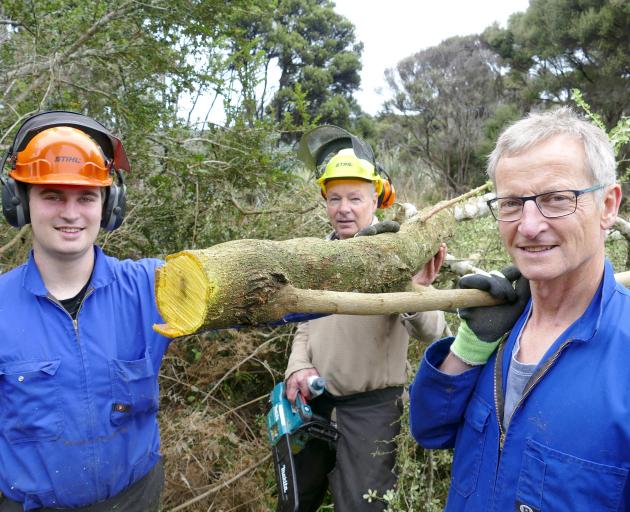The Papatowai Barberry Busters began their attempt to eliminate Darwin’s barberry from the village in 2009, little suspecting they would still be at work 12 years later.
Now they have reached that local milestone, they would like regional authorities to launch a wider eradication campaign.
Group spokesman Ian Morison said they had only an incomplete idea of the scale of the issue in the group’s early stage.

"My son Reuben, who was about 9 at the time, was very interested in conservation, and he really pushed us to keep going at the outset and, once he was able, became a useful volunteer himself.
"Although we knew [barberry] was present in large clumps in some locations, the extent of its spread has been a continual surprise, which has meant it’s probably taken us a bit longer than we initially expected to reach this milestone."
The South American native Berberis darwinii — introduced to New Zealand about a century ago as an ornamental due to its attractive orange flowers — was first brought to the Papatowai area by an "enthusiastic gardener" about 60 years ago, Mr Morison said.
Well-adapted to grow at the edge of native bush stands, the 5m barberry could grow rapidly upwards and sideways to monopolise light and smother adjoining plants.
Tasty berries ensured its spread via birds and other wildlife.
Mr Morison said elimination of the plant required only a chainsaw and stump poisoning.
"It’s relatively simple, if laborious, to get rid of. We’ve recorded more than 500 hours of clearance between the three core members, and there will be a good few more from other community volunteers and ourselves before we started the log.
"Add to that about $5000 spent on equipment and pesticides, and you could say it’s been a labour of love."
Although the Otago Regional Council had funded $1500 of equipment last year through the EcoFund, Mr Morison said he would now like the ORC to take a leadership role in expanding eradication efforts in the province.
Other regional authorities — including Environment Southland — classified barberry as a pest plant, allowing efforts to be co-ordinated and funding to be sought.
"Having shown it can be done, we want to challenge others. We’ve achieved local control, but there is a far larger problem beyond our borders.
"To us barberry is like botanical Covid-19. Like Covid-19, where there is a role for international governance, we suggest ORC should play a far stronger role in leading the fight against barberry.
"We’d like them to follow the example of Environment South, which has clear, strong policies about barberry control."
Although the group was "satisfied" to have cleared Papatowai of the pest, it did not feel it could celebrate just yet.
"I go through oscillating periods of optimism and despair," Mr Morison said.
"It feels pretty good to have cleared it from the village, but you look at the wider problem, and you just think, ‘Where next?’.
"We need a small army."














